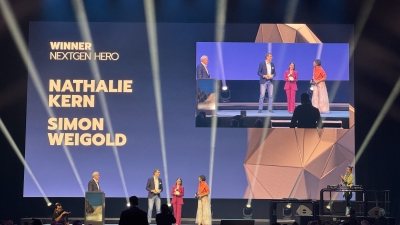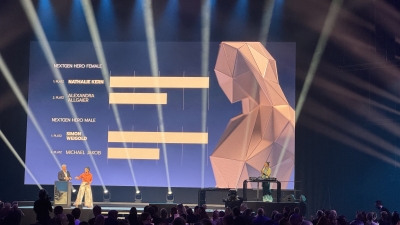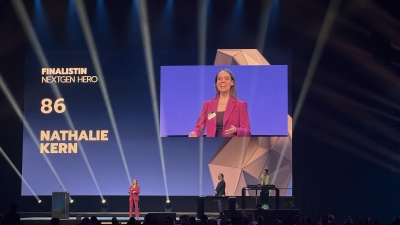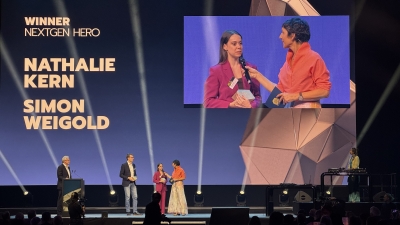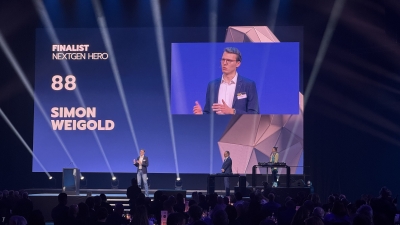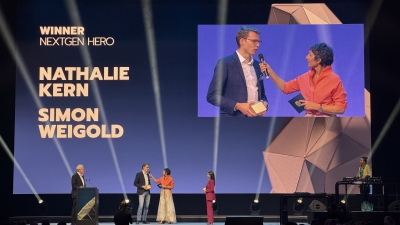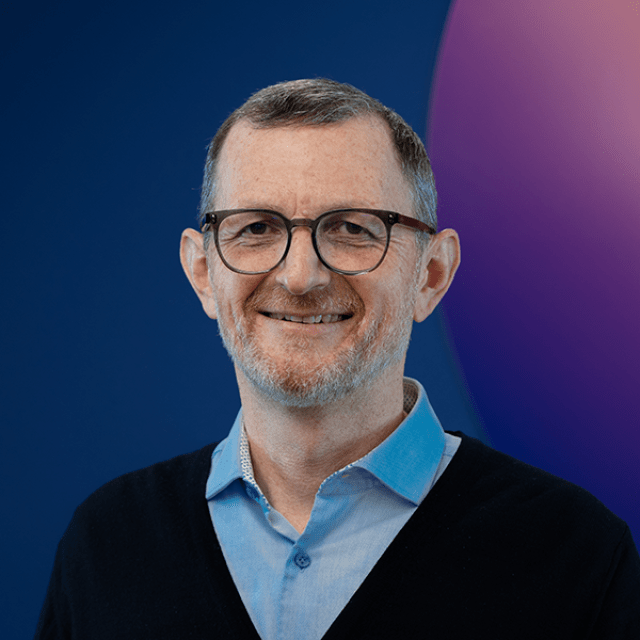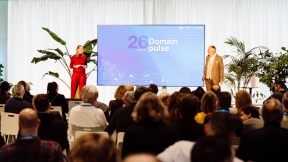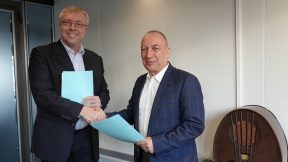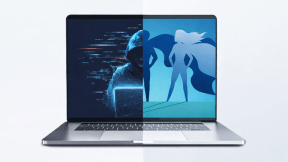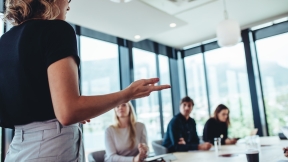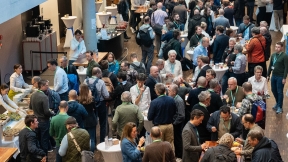Where ideas take flight
On 13 November 2025, Zurich's Hallenstadion once again became a meeting place for digital thought leaders. Four young finalists competed for victory in the ‘NextGen Hero’ category at the Digital Economy Award Night with their inspiring, bold and creative ideas. Who came out on top in the end, and what is behind their ideas?
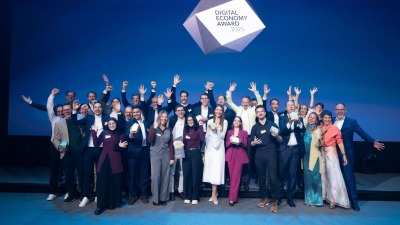
It was an evening when visions became tangible. The spotlight swept across the faces of the eager audience, applause vibrated in the air and, somewhere between stage fright and excitement, the pulses of the four finalists raced. Two young women and two young men competed against each other, united by their courage in presenting their ideas for the future to a packed hall. These ideas are intended to help shape tomorrow's digital Switzerland.
90 seconds to present an idea that could change the world
That was how little time the finalists had to convince the audience at the Hallenstadion of the merits of their projects. 90 seconds in which they had to speak with conviction to ignite the audience's enthusiasm. Those in the spotlight on stage had no second chance – every sentence, every argument and every gesture had to be perfect.
The audience as the jury
Following the live pitches, the decision was entirely in the hands of those present. In a hall vote, they chose the two who had touched, convinced and inspired them the most: a young woman and a young man. There was no expert jury or panel of experts; the title of ‘NextGen Hero 2025’ was awarded that evening based on the audience's honest and immediate enthusiasm.
And the winners are
The winners of the NextGen Hero 2025 young talent category are: Nathalie Kern, who harmonised the software landscape in the public sector; and Simon Weigold, who developed an open-source tool to support those with limited access to legal advice.
We met the two newly crowned heroes and talked to them about their projects, their inspiration, and the future of digital Switzerland.
Â̲èÖ±²¥: Dear Nathalie, congratulations on winning the Digital Economy Award in the NextGen Hero category! If you had to sum up your project in one sentence, what would you say?
Nathalie Kern: I am creating a comprehensive map of all the IT-related tasks of the cantonal administration and linking them together.
What thought or experience originally inspired you to start your project?
During my part-time studies, my boss suggested the topic for my master's thesis. He introduced me to the world of IT, which is why I work in this field today.
You wowed the audience tonight. What do you think made the difference?
I believe the audience recognised the importance of my niche topic, and that we must work more closely together to tackle it.
A 90-second pitch is less time than a song on the radio. How did you prepare for it?
To be honest, I was quite overwhelmed. Thankfully, I was then able to take part in pitch training, which gave me lots of ideas. This resulted in a first draft, which I revised with my pitch coach. After some back-and-forth, I finally had my finished pitch.
Every innovation has its hurdles. What was the most difficult moment for you during the development process?
The biggest challenge was creating an overview of all the tasks involved in digital administration, ranging from education to the various duties of the federal government. I had to create this overview in such a way that it could serve as a template for every canton and municipality. This resulted in modular tasks that can be shown or hidden.
What is your next goal?
I will continue working on my master's thesis in collaboration with Digital Administration Switzerland. I am part of an architecture group there where I can develop my project further and turn it into an .
Finally, what role does your project play in your vision of digital Switzerland in 2035?
I hope my project will highlight areas of excessive administrative spending, enabling politicians to make informed strategic decisions and fostering a more innovative digital administration.
Â̲èÖ±²¥: Dear Simon, congratulations on winning the Digital Economy Award in the NextGen Hero category. If you had to sum up your project in one sentence, what would you say?
Simon Weigold: In legal cases, real-life facts are always recorded in a large number of documents. The most important elements of these documents are analysed and used in processes such as court decision-making. I automate this process using LLMs, which are perfectly suited to the task. To achieve this, I have developed an application that has been reviewed by legal experts and is based on open-source software. It provides lawyers with reliable, easy-to-use answers. My application is currently particularly well suited to court decisions, as these must follow a highly standardised process.
What inspired you to start your project?
As part of a legal research project, I collected a large amount of data, including documents and court decisions. The next step was to analyse this data. I wanted to know what information and interpretations it contained. When lawyers carry out this analysis manually, it is very time-consuming. This is why I wanted to automate the process. This enables much more data to be analysed in a much shorter time.
You wowed the audience tonight. What do you think made the difference?
I think they understood how important it is to use open-source software. Not only is open source software safer and more reliable in the legal field, it is also generally cheaper.
A 90-second pitch is less time than a song on the radio. How did you prepare for it?
First, I wrote down what I wanted to say. Then, through an iterative process, I shortened the content until I had everything essential within the time limit.
Every innovation has its hurdles. What was the most difficult moment for you during the development process?
The most challenging aspect has been and continues to be the reliable documentation of the automated analysis. With my AI assistant, I try to cover as many user needs in the legal field as possible. However, every single analysis must be verified by a lawyer. That's a time-consuming process. However, I am making this process open and transparent by using open-source software. This enables as many people as possible to contribute and evaluate the effectiveness of the AI assistant and suggest improvements.
What is your next goal?
The next step is to reach out to students. I want them to learn that technology is beneficial when it is open and open-source.
Finally, what role does your project play in your vision of digital Switzerland in 2035?
I would like to see open principles applied in legal practice, administration, and the courts. The future of the legal sector is digital. I very much hope that open-source software will gain and maintain the upper hand in legal technology.
Further Info
- These four individuals and their projects were in the final.
- About the .
